Base shown; Uplevel similar
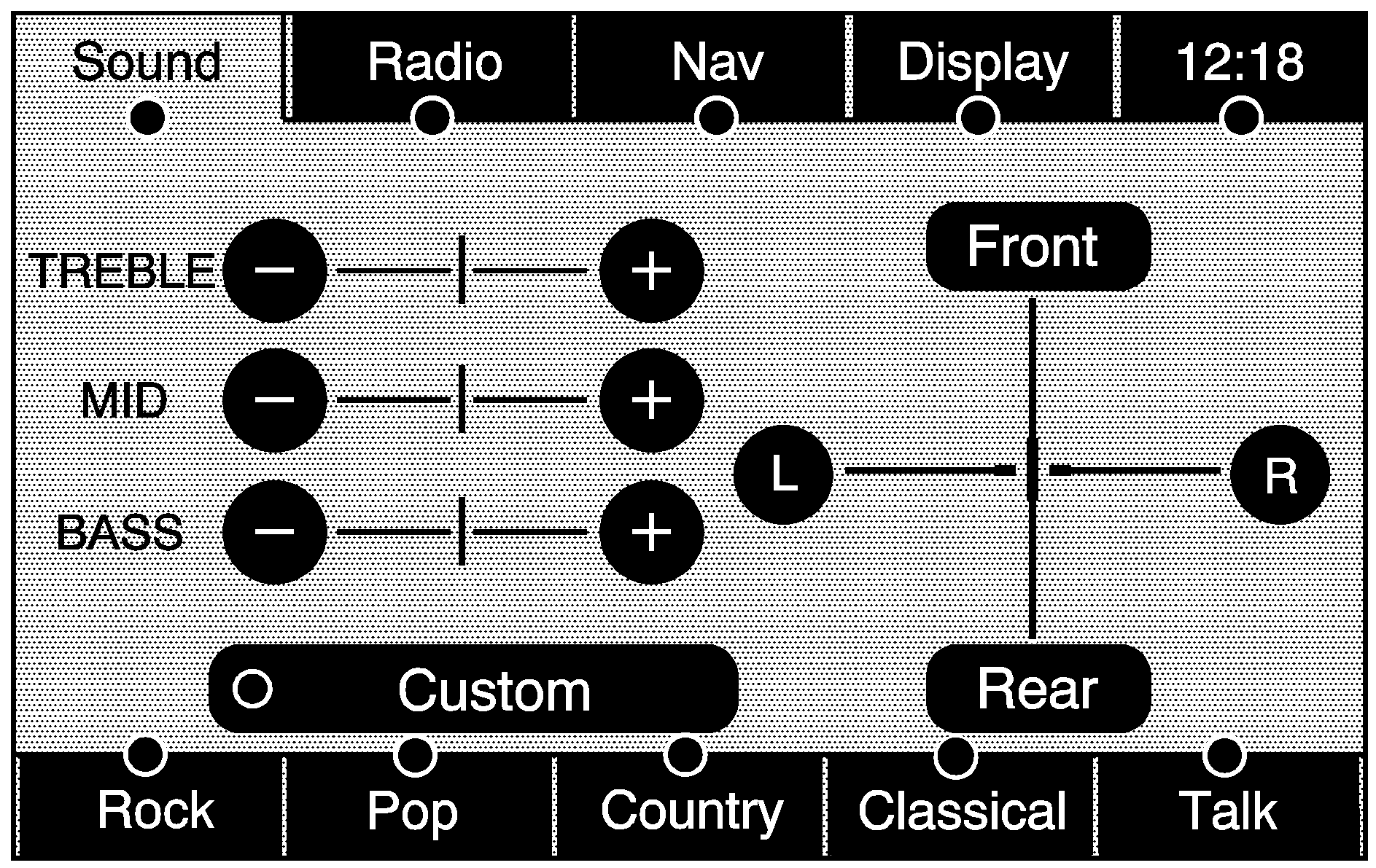
Press the MENU hard key to adjust several of the system's features and preferences. The last selected menu screen is the screen that displays; Sound, Radio, Nav (navigation), Display, or Time.
Sound
Press the MENU key to enter the menu options, then press the MENU key repeatedly until Sound is selected or select the Sound screen button. To make speaker and equalization adjustments. See Navigation Audio Systemfor more information.
Radio
Press the MENU key to enter the menu options, then press the MENU key repeatedly until Radio is selected or select the Radio screen button, to make changes for radio information displayed, preset pages, XM™ categories, and automatic volume control. See Navigation Audio System for more information.
Traffic Options
Read the following Options descriptions to understand how the XM NavTraffic™ operates.
XM NavTraffic™ (USA and Canada)
Your vehicle's navigation system may have an XM NavTraffic receiver. XM NavTraffic is a subscription service provided via XM™ Satellite Radio. XM NavTraffic provides real-time traffic information fully integrated to the navigation system to display current traffic conditions for a driver’s chosen route. XM NavTraffic allows drivers to make the most informed, timesaving routing decisions.
If the Traffic touch screen button is pressed or if the traffic display in the Navigation Setup Menu is attempted to be turned on without a subscription, a warning screen displays indicating that XM traffic is not activated.
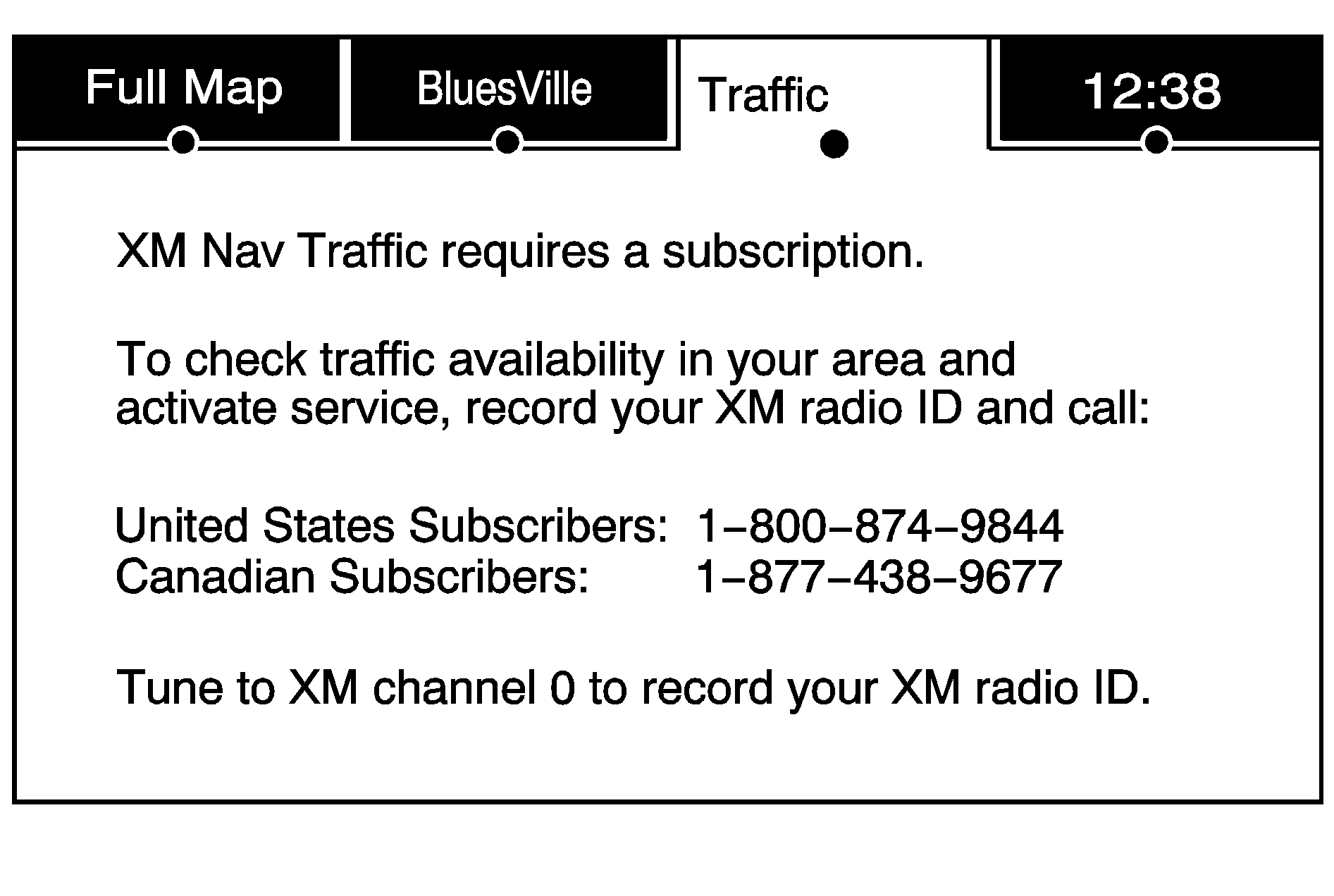
Three types of traffic information for major roadways are displayed on the navigation system:
| • | Unscheduled traffic incident data, such as accidents and disabled vehicles |
| • | Scheduled traffic incident data, such as road construction and road closures |
| • | Traffic flow information (rate of speed data) |
Traffic information is delivered to the vehicle by the XM™ Radio satellites. XM NavTraffic makes it possible for the navigation system to provide continuously updated traffic information personalized for a driver’s needs.
XM NavTraffic currently broadcasts the traffic information for many markets nationally, and the service may be available in more cities in the future. Visit xmnavtraffic.com for more details on local coverage.
A service fee is required in order to receive the XM NavTraffic service.
Turning XM NavTraffic™ On and Off
To turn traffic on or off:
- Press the Menu hard key, then press the Menu key repeatedly until Nav is selected or press the Nav screen button.
- Touch the Traffic Options button.
- Touch the Traffic button. This button is highlighted when it is active.
Selecting Alert for Approaching Traffic Events enables the system to show a pop-up screen that notifies of possible traffic issues ahead.
When this feature is highlighted, while traveling on a route, you are able to view and avoid accidents that are on the route.
Traffic Icon
The Traffic Icon appears on the Traffic Tab, next to the word Traffic, when traffic is found in the local area.
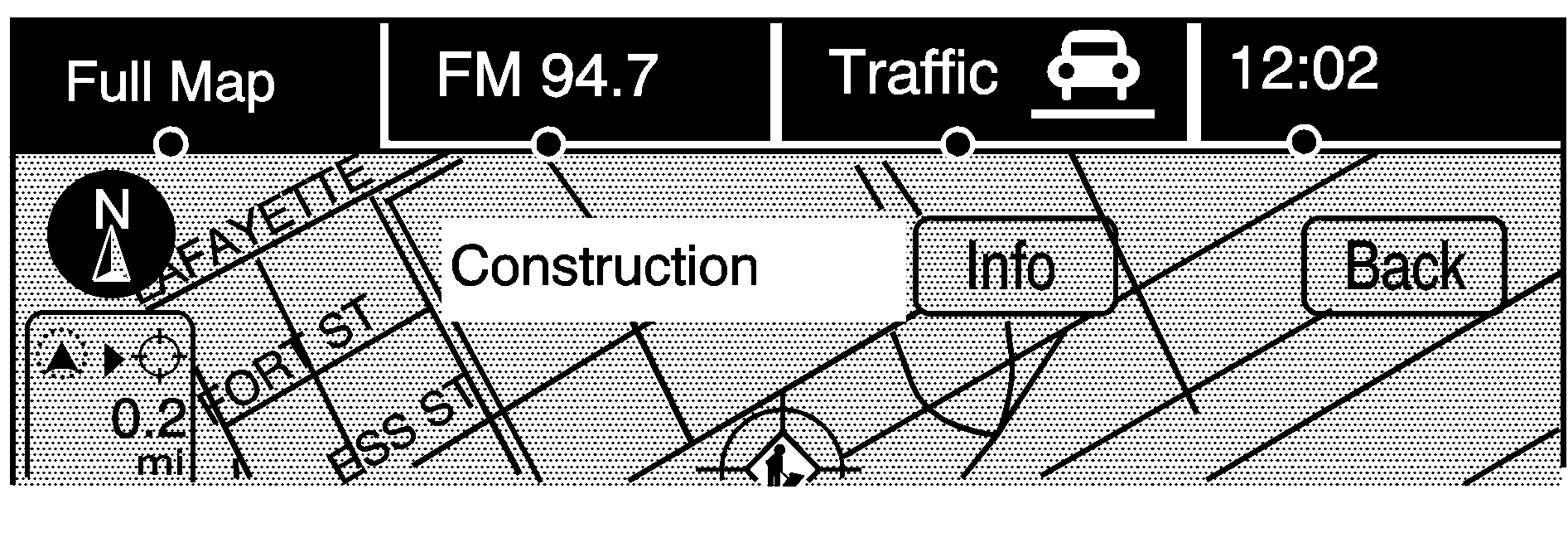
The Traffic Icon has three different condition displays. These are:
Condition | Traffic Status Icon | ||||||
|---|---|---|---|---|---|---|---|
|
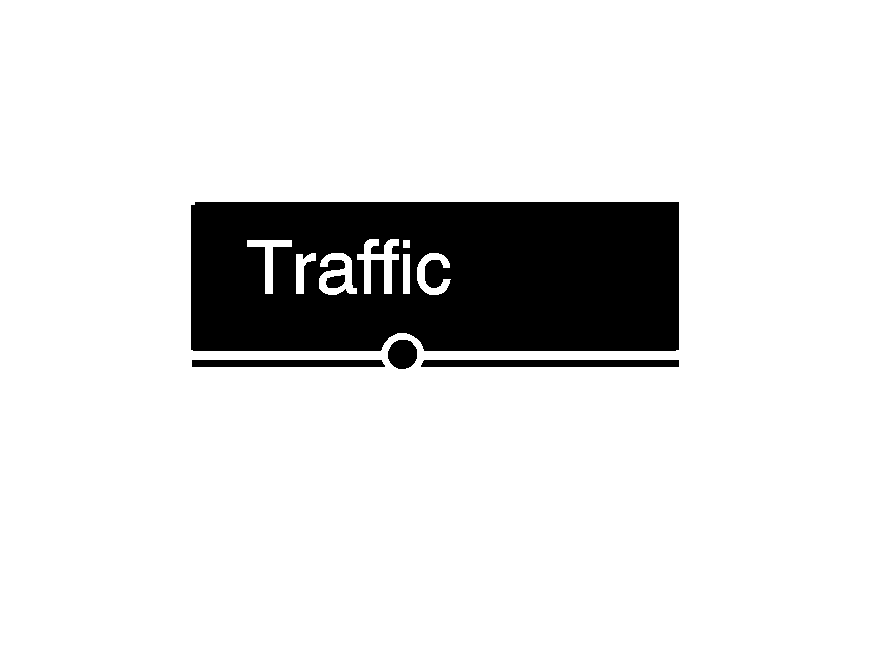
| ||||||
Traffic events are in the area, but none are on route. |
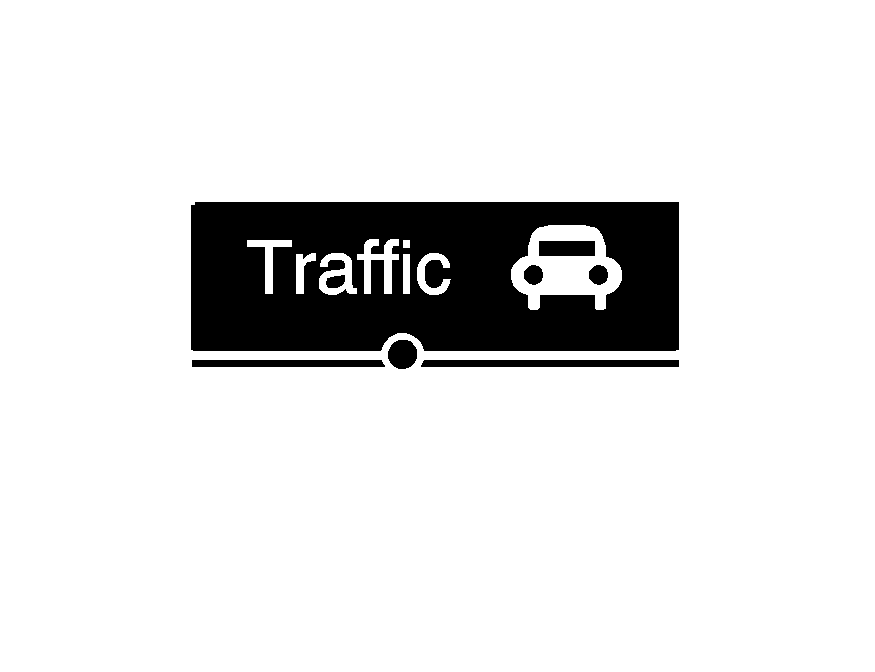
| ||||||
Traffic events are on route. |
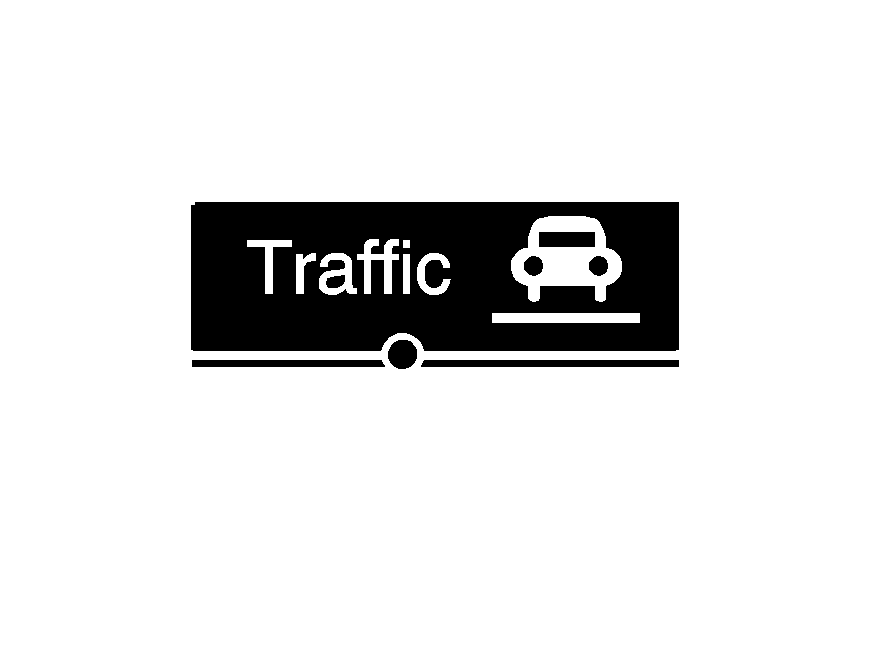
|
Locations and Information of Traffic Conditions
The system may take some time to sort the information. The list of traffic conditions display in the order of distance from the vehicle, for up to approximately 150 mi (240 km). If traveling on a planned route, the list can be filtered to see traffic conditions along the planned route. Not all traffic conditions may be listed.
To view the traffic condition location and information on the map:
- Press the NAV key, then press the NAV key repeatedly until Traffic is selected, or touch the Traffic screen button. A list of traffic conditions may display with the direction and how far away the traffic conditions are from the vehicle's current position.
- Select a traffic condition to get more detailed information of the event.
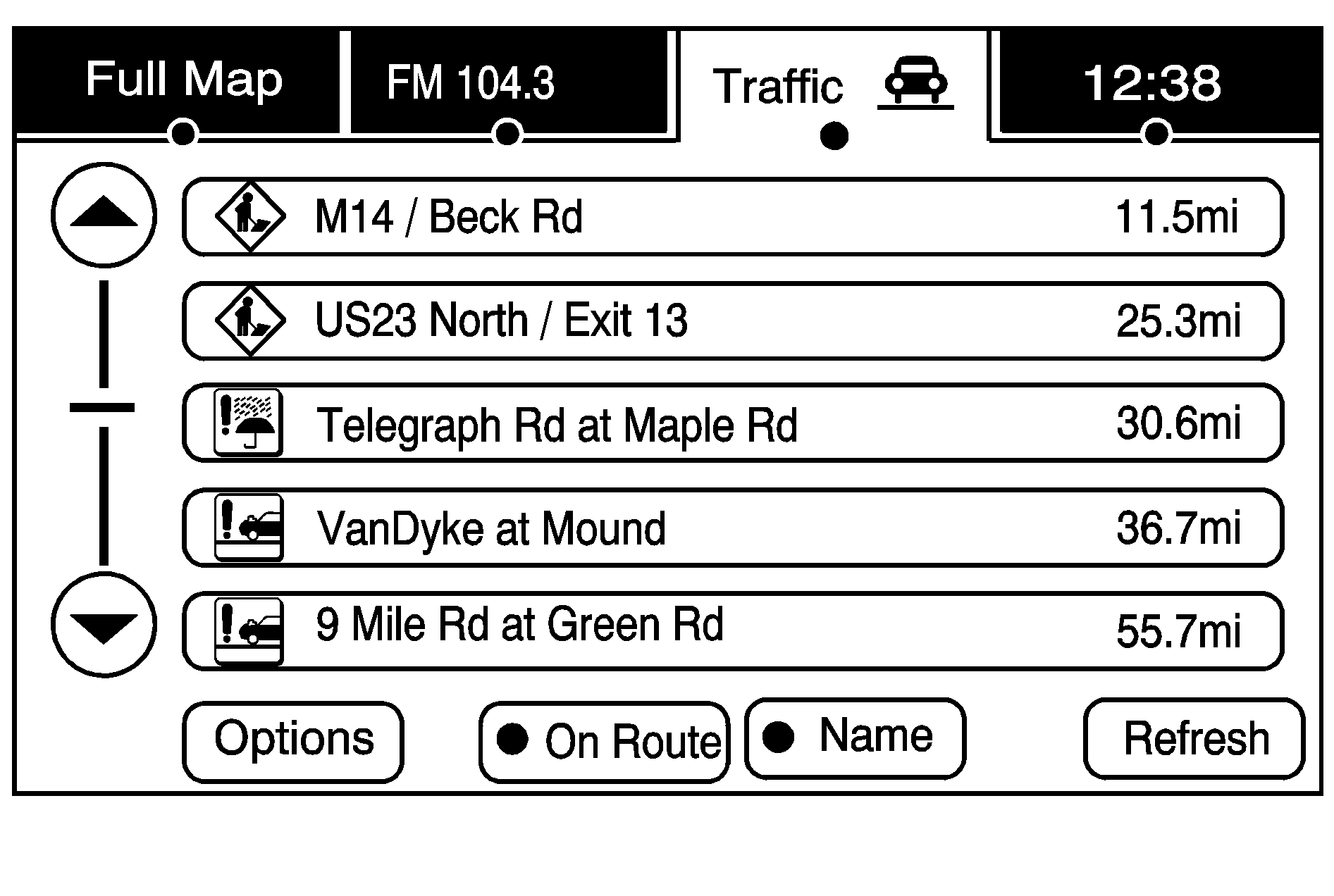
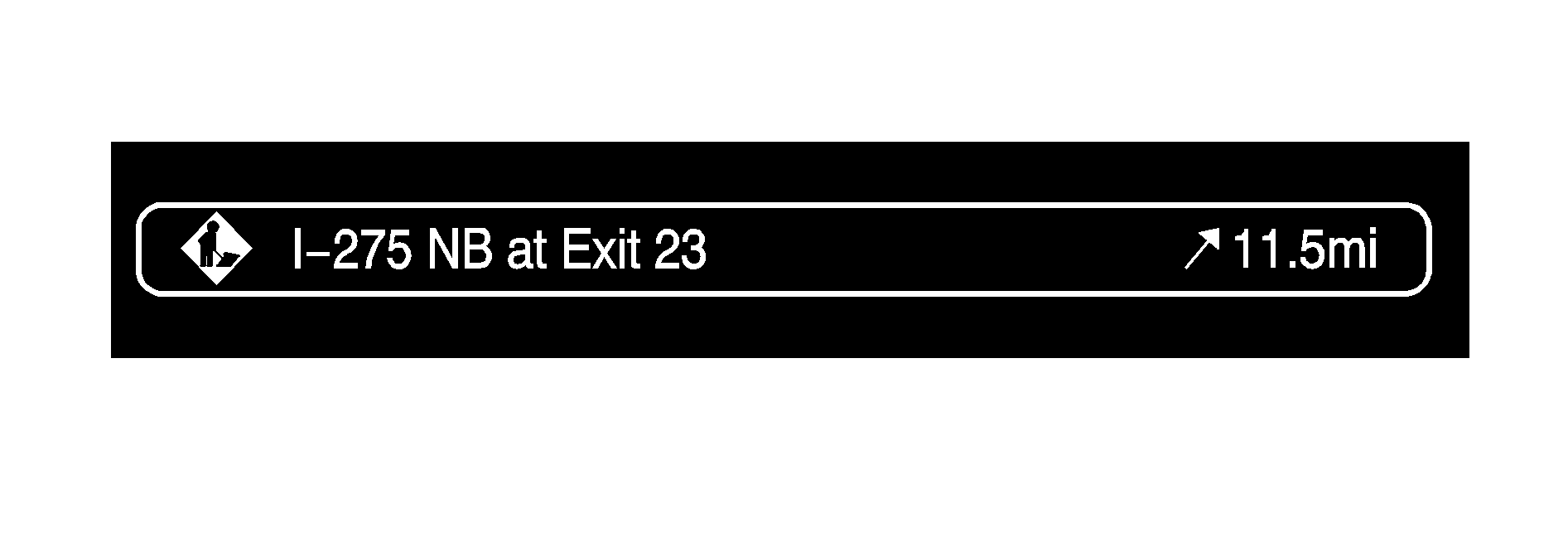
Options
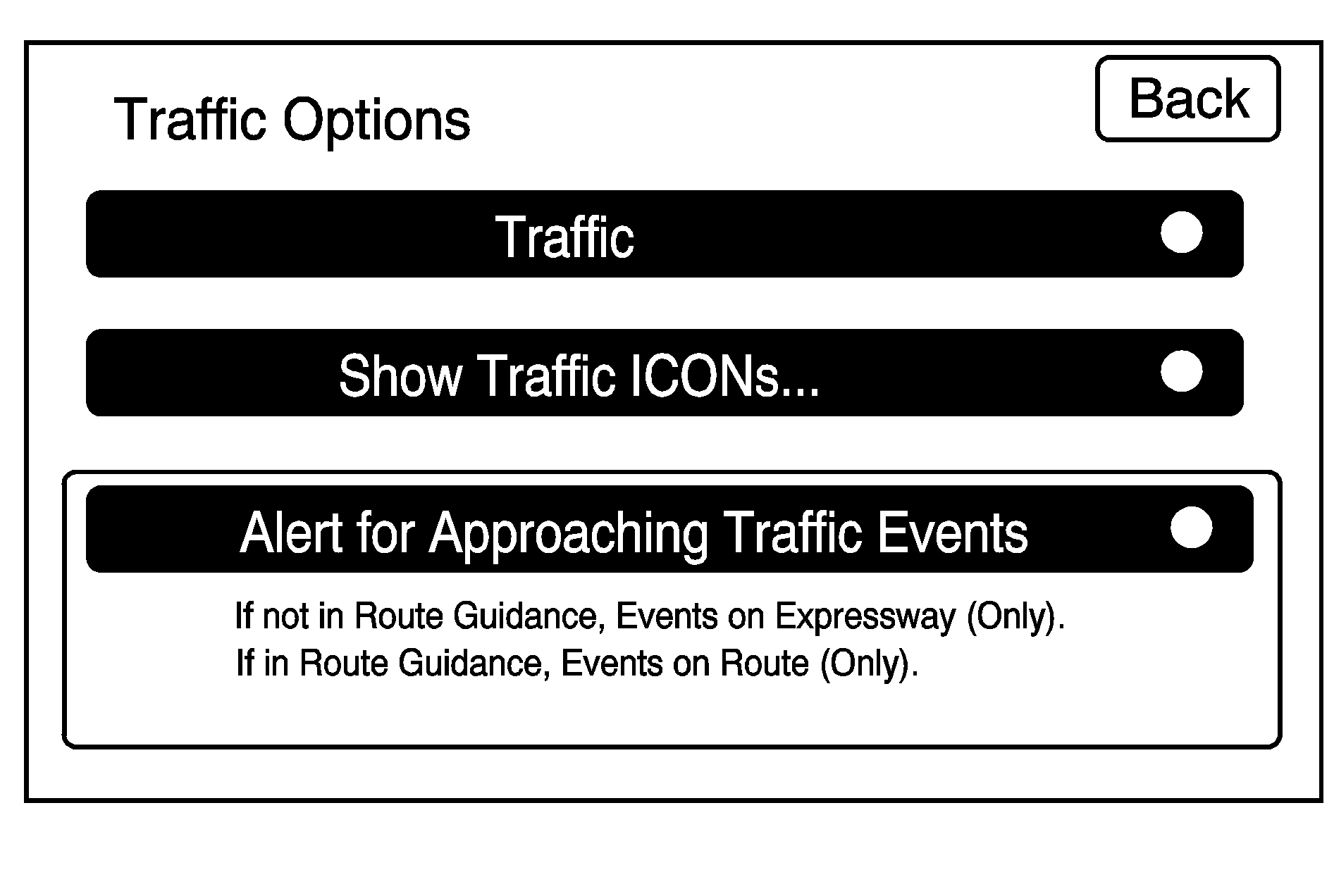
Select the Options screen button. A Traffic Options menu displays. Select the desired traffic related option.
Traffic: Select to enable or disable the traffic function.Show Traffic ICONS: Select to display traffic icons on the map screen. This function allows selection of the traffic information that is displayed.
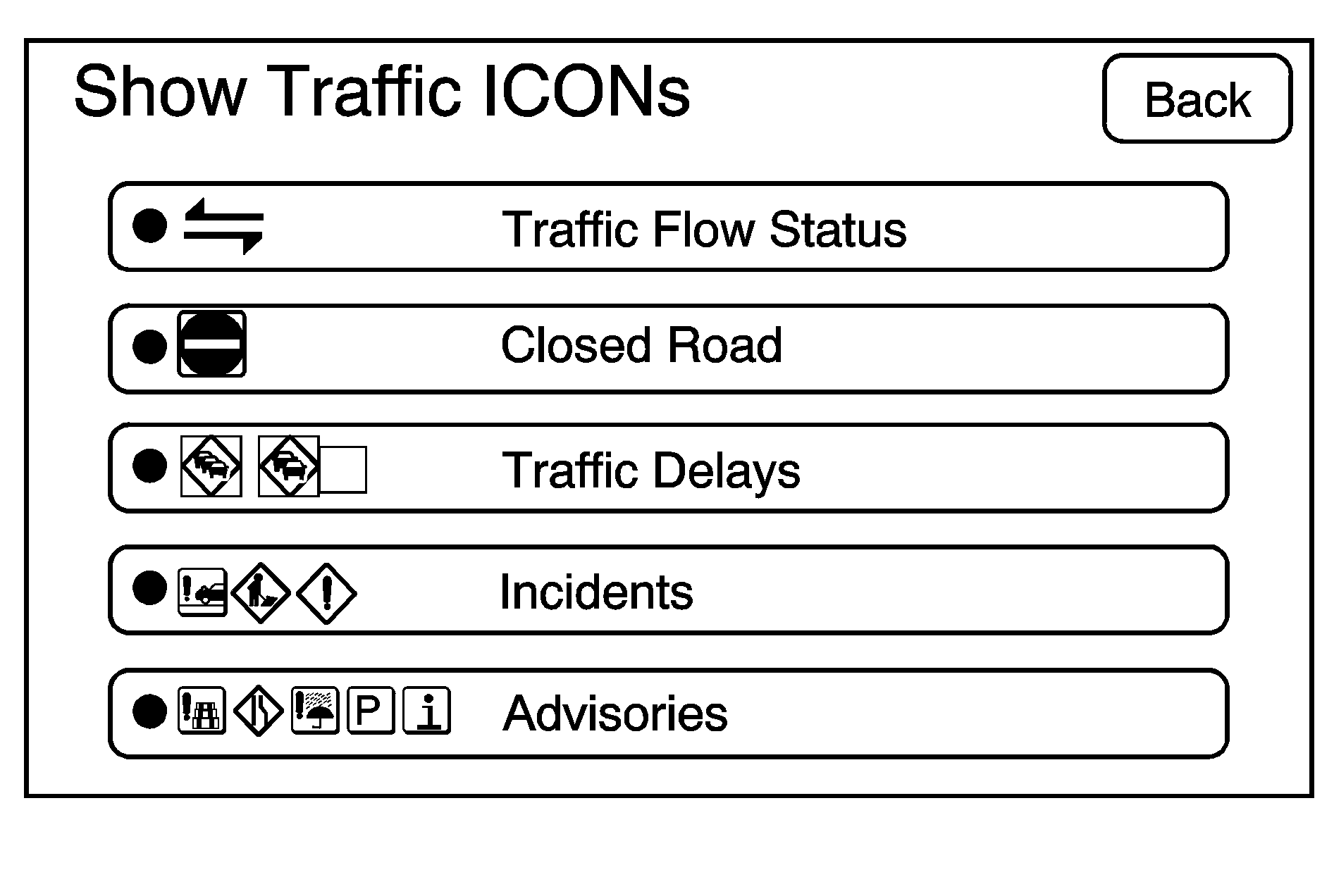
Traffic Flow Status -- This touch screen button is used to enable or disable the green, yellow, red and orange arrows shown beside the roads and used to show the traffic flow or extent of a traffic event.
| • | Black indicates a closed road segment |
| • | Red indicates significantly impaired traffic flow with average speed between 25 and 45 mph. |
| • | Yellow indicates slightly impaired traffic flow with average speed between 25 and 45 mph. |
| • | Green indicates normal traffic flow with average speed above 45 mph. |
| • | Orange indicates construction. |
Traffic flow data arrows display on the map when scaled up to eight miles.
Closed Road, Traffic Delays, Incidents, and Advisories -- These four touch screen buttons are used to select the traffic event ICONS that appear on the map screens.
Alert for Approaching Traffic Events: When On, if an approaching traffic event is within the alert range, one of two traffic alert pop-up screens display:| • | With no route planned, while on expressways, Approaching Traffic Event without Avoid screen displays. |
| • | With route planned, Traffic Event on Route screen displays. |
If the Alert for Approaching Traffic Events is Off, the alert pop-up screen does not display.
On-Route
Select the On Route touch screen button to display all events ahead on the current active route. If no traffic events have been reported on route, No Traffic Events Reported On route displays.
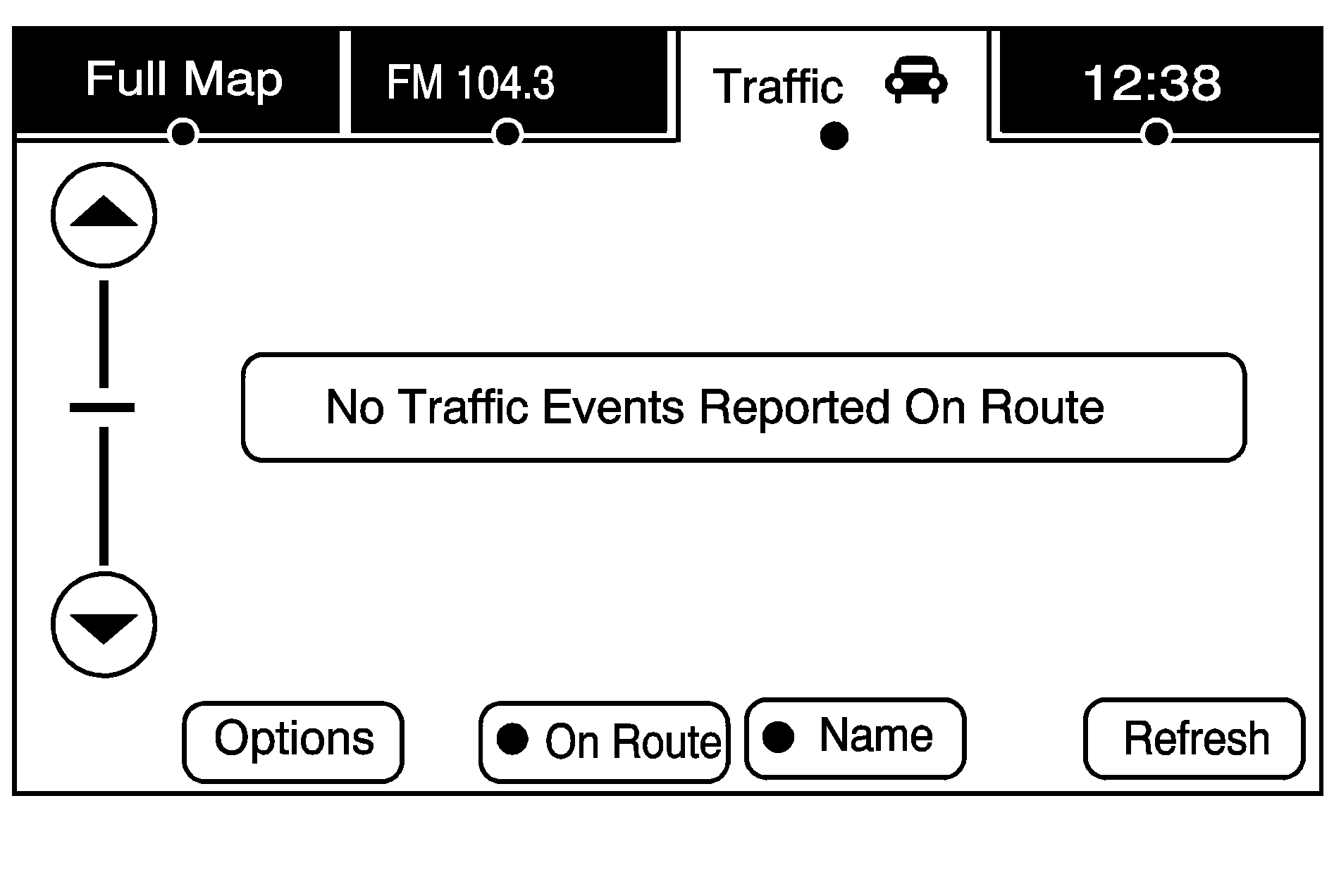
Name
Select the Name touch screen button to display traffic events in the order of distance. The closest event is shown first.
Avoid
When a route is active, the Avoid button is used to route around the listed traffic event. After calculating a new route, the navigation system shows a new route on the full map screen. The Avoid button is grayed out if the traffic event is not on route or no route is active.
Refresh
Select the Refresh touch screen button to update the screen with all of the latest traffic events, miles, etc.
Scrolling to Traffic Events on the Map
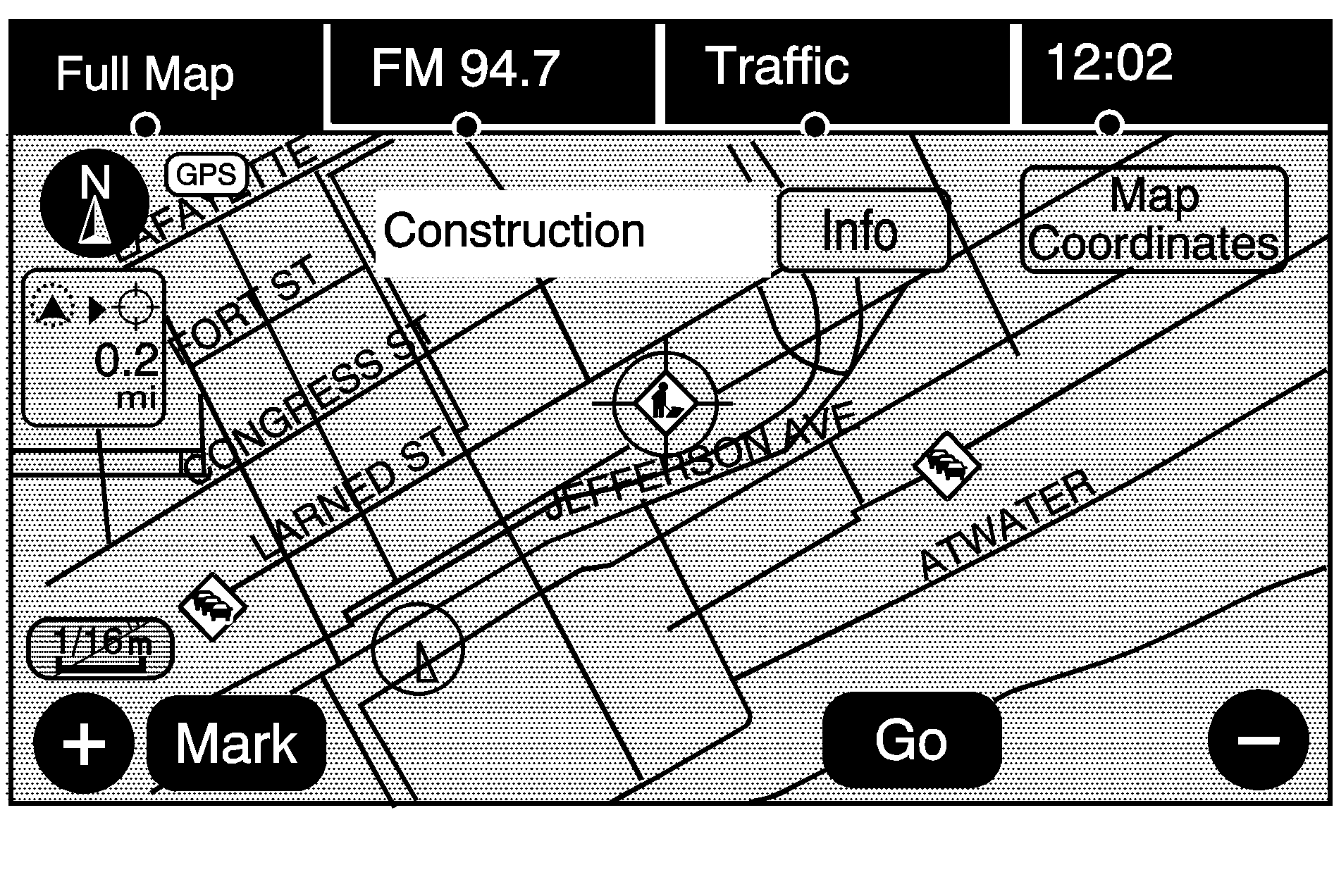
While scrolling the map, traffic condition icons may appear. To receive information about the traffic condition, place the cross hairs over the traffic condition icon. After selecting the INFO (information) screen button, the type of traffic condition, the street name, and a description of the traffic condition displays. See "Scrolling the Map" under Maps for more information.
Traffic Event Display Categories
The following are traffic condition categories and symbols that can appear on the display:
Category 1, Road Closure:
(Road Closed): Road and/or ramps closed.Category 2, Traffic Delayed:
(Stopped Traffic): Traffic stopped, stop and go traffic, delayed and congested traffic.Category 3, Incidents:
(Alert): Object in the roadway, disabled vehicle, or dangerous road conditions.(Accident): Roadway obstructed due to accident.
(Road Works): Delayed traffic due to construction.
Category 4, Advisories:
/ (Road Condition): Delayed or stopped traffic, lane blocked or closed due to a road condition.(Weather): Heavy rain, snow, or fog weather condition.
(Parking): Available parking area.
(Information): Special event, general information, or warning.
Detailed Traffic Event Screens
There are three different types of detailed traffic event screens. Each screen is a variance of the one shown on the Traffic Event Screen.
Traffic Event Screen
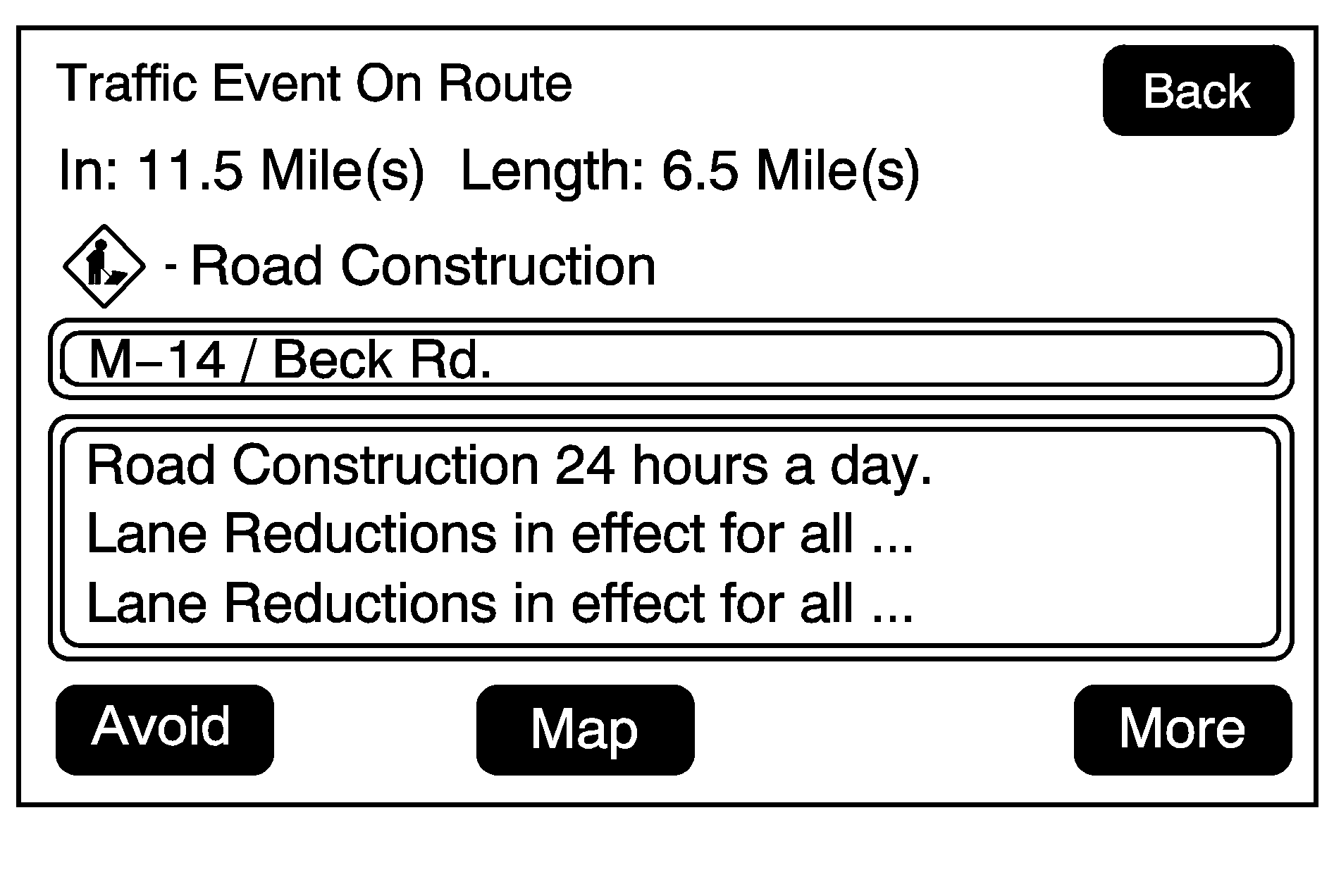
The Traffic Event screen is used when the traffic event is not being approached on the expressway or on a route. This screen may display if:
| • | Scrolling to an event on the map and then pressing INFO. |
| • | Selecting a traffic event listed on the Traffic Event List screen. |
Back, Map, More, and Avoid
These buttons have common functions across all three Detailed Traffic Event screens.
Back: Press to return to the screen used to display the selected detailed traffic event.Map: Press to show the related traffic event on the map. If selected, the Map Traffic Event Icon screen displays.
Map Traffic Event Icon with Back Screen
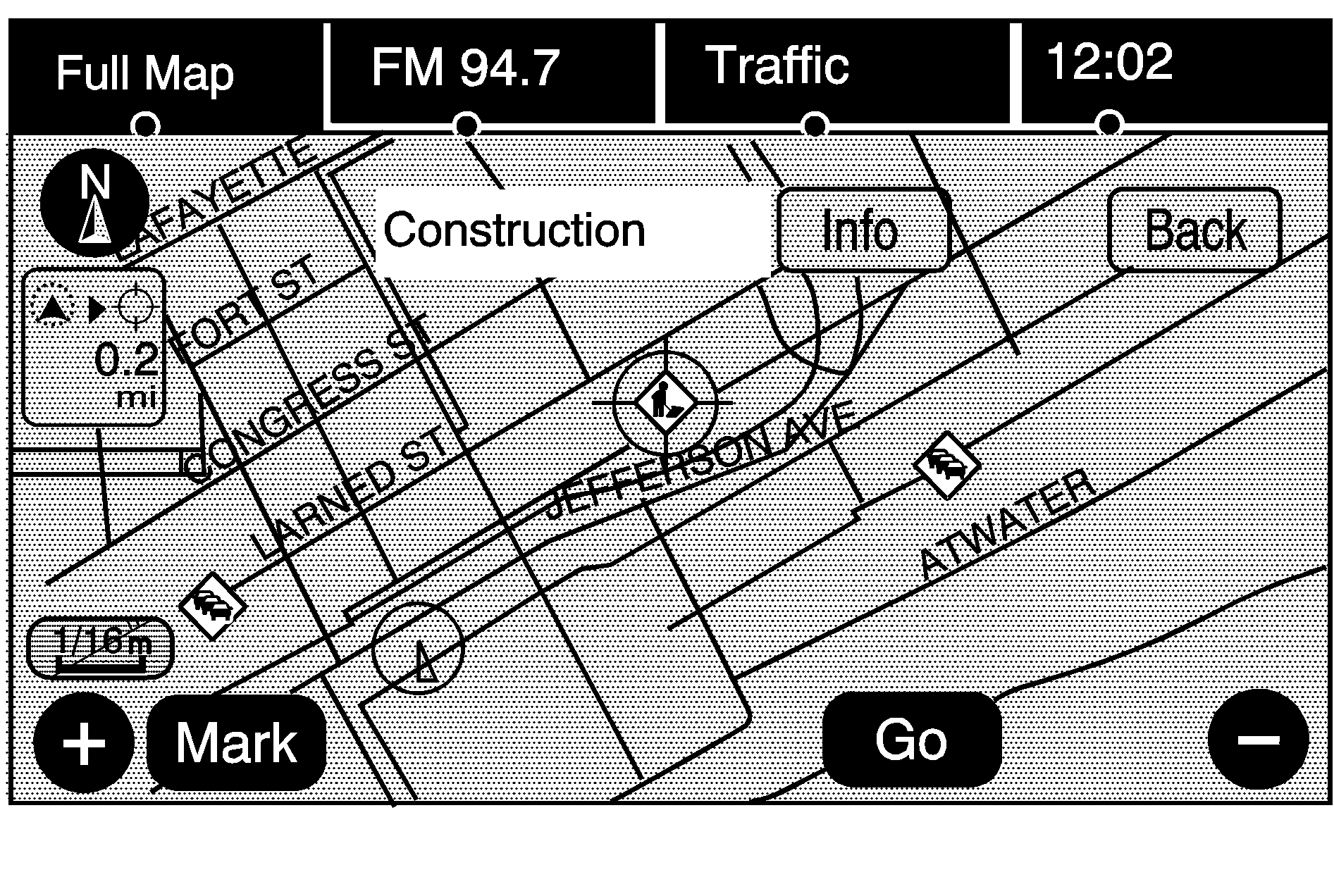
Scroll to the new traffic ICON, and the INFO button displays for that traffic event. Press INFO and the detailed traffic event screen displays. Press the NAV hard key to go back to the Full Map screen.
More: Press to display more of the traffic event description, if the whole event does not fit in the given display.Avoid: This button is used to avoid the location of an event on the route. If selected, a new route is calculated and the related traffic event is avoided. After the new route has been calculated, the navigation system goes to the full map screen and shows the new route.
Traffic Voice Prompts
The traffic voice prompts are part of the current navigation voice prompts. If the navigation voice prompts are turned off, all traffic prompts are also turned off.
If the voice prompts are on, whenever an Alert for Approaching Traffic or Alert if Better route Available is displayed, the system gives the related voice prompt. The content of the voice prompt depends on actual traffic event data.
The RPT (Repeat) hard key is for navigation traffic maneuvers only. It is not used to repeat traffic prompts. During a traffic voice prompt, if RPT is pressed, the current prompt playback cancels.
Anything that cancels the Alert for Approaching Traffic, also cancels the related voice prompt.
Traffic prompts are disabled during OnStar® or Voice Recognition activity.
Display
VUE shown
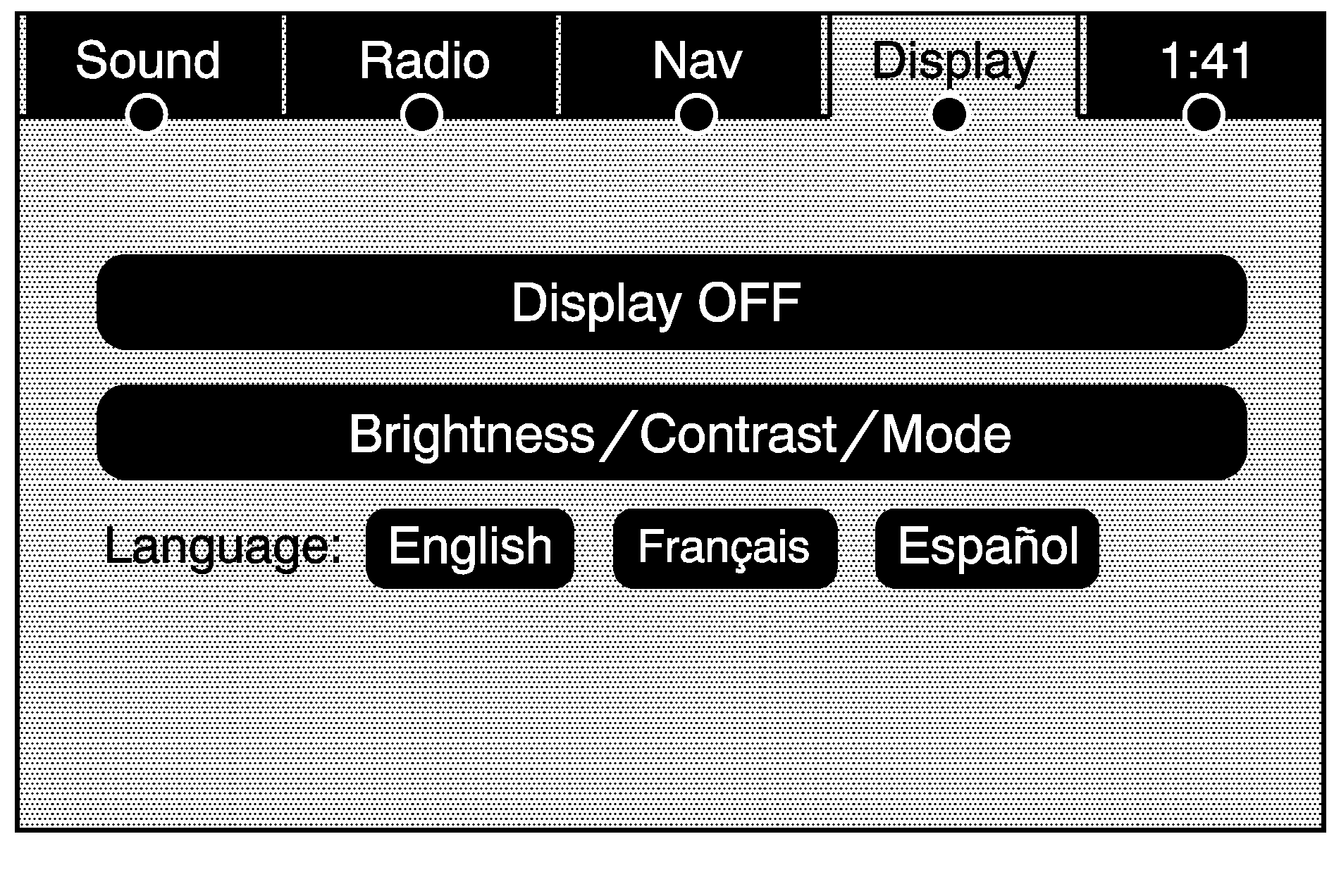
Press the MENU key to enter the menu options, then press the MENU key repeatedly until Display is selected, or select the Display screen button.
Display Off
Select this button to turn the display off. Press the Nav, Dest, Fav, or Menu hard key or the (tone) button to view the display.
Brightness/Contrast/Mode
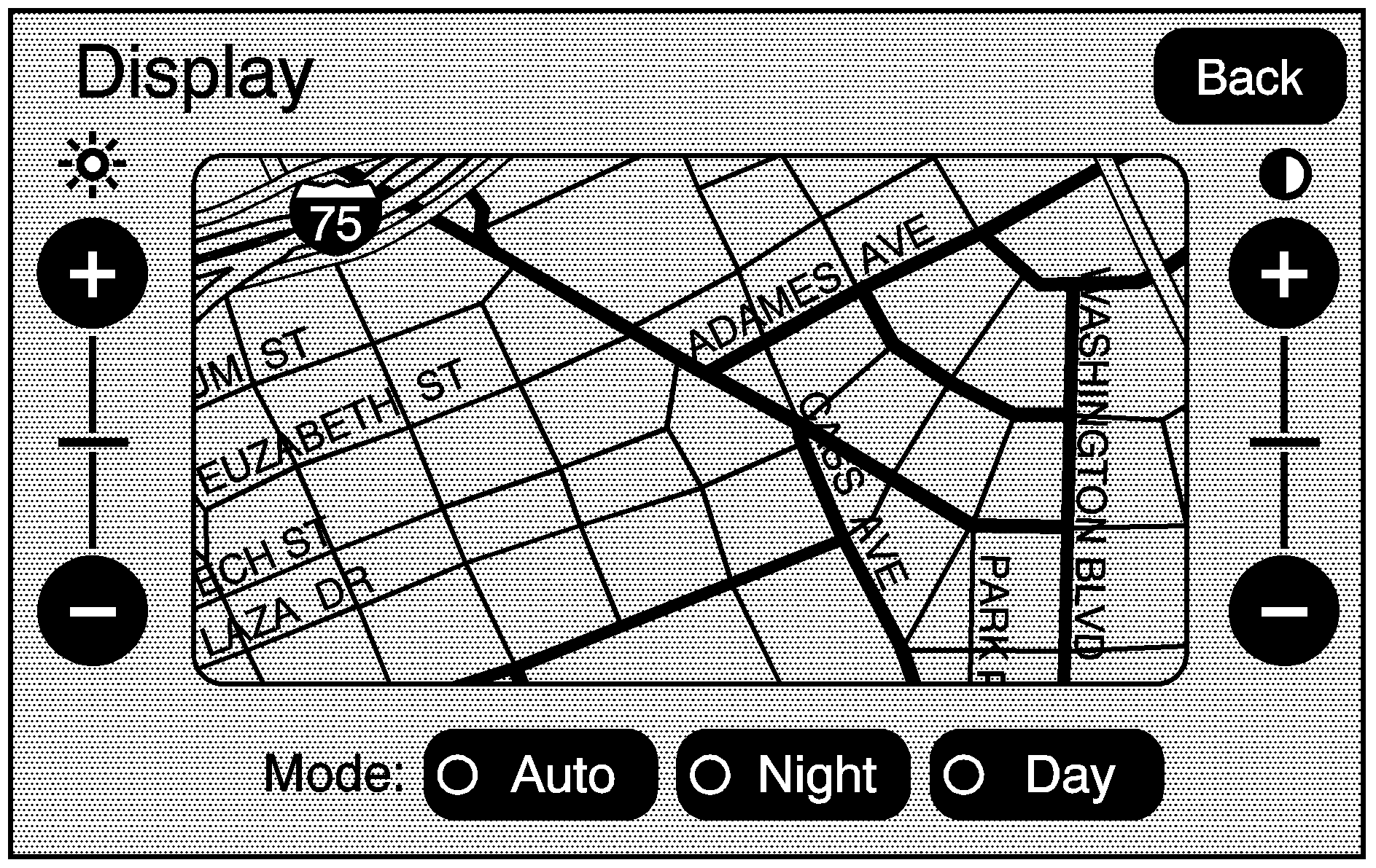
Select this screen button to change the brightness, contrast, and mode of the display.
(Brightness): Select and hold the + (plus) or - (minus) to increase or decrease the brightness of the screen.(Contrast): Select and hold the + (plus) or - (minus) to increase or decrease the contrast of the screen.
Auto (Automatic): Select this screen button so the system can automatically adjust the screen background depending on exterior lighting conditions.
Night: Select to make the map background darker.
Day: Select to make the map background brighter.
Rear Vision Camera Options (Acadia, Enclave, OUTLOOK, and Traverse Only)
The vehicle may be equipped with a Rear Vision Camera system and/or a Rear Park Assist to enhance awareness of what is behind your vehicle. These systems engage only when the transmission shift position is in R (Reverse). See "Rear Vision Camera" and/or "Park Assist" in the index of the vehicle's owner manual for more information.
VIDEO (for camera) and AUDIO (Park Assist) screen buttons may display. Touch either screen button to turn these features on or off. Both features are defaulted to on.
Eject Map Disc
This screen option is available when the map disc has to be ejected for replacement. The map disc should only be access when updating with an annual update or when and if a map disc read error displays during normal use. See "Ejecting the DVD Map Disc" earlier in this section for more information.
Language
Saturn VUE and VUE Two-Mode Hybrid Only -- Select the English, Francais or Espanol screen buttons to change the language of the navigation screens.
If the vehicle has a DIC, see "DIC Vehicle Customization" in the Index of the vehicle's owner manual to change the language of the navigation screens
Setting the Clock
Press the MENU key to enter the menu options, then press the MENU key repeatedly until the time is selected, or select the time screen button, then press the Set screen button.
Hours: Select and hold the - (minus) or + (plus) to decrease or increase the hours.Minutes: Select and hold the - (minus) or + (plus) to decrease or increase the minutes.
12/24 Format: Select the 12 screen button for standard time; select the 24 screen button for military time.
